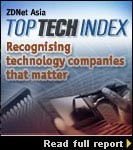Linspire offers to license all Korean PCs

Linux vendor Linspire has offered to license every PC in South Korea with its open-source operating system for US$5 million, should Microsoft choose to withdraw Windows from the country.
Kevin Carmony, president and CEO of Linspire, confirmed in an e-mail interview with ZDNet Asia, that he wrote to South Korean President Roh Moo-hyun, with the offer to license every computer in the country with Linspire for basic desktop and laptop use.
According to South Korea's Broadband IT Korea Vision 2007 report published last April, there are more than 2.6 million PCs in the country.
"Considering Microsoft posted sales of US$224 million in Korea for 2004, which was less than 1 percent of Microsoft's total global revenue of US$37 billion, South Korea could save around a quarter of a billion dollars," Carmony said, on his company’s Web site. "More importantly, however, it would break South Korea loose from the monopolistic grasp of Microsoft."
According to a Microsoft filing to the U.S. Securities and Equities Commission, the Korean Fair Trade Commission (KFTC) has been investigating if the inclusion of streaming media or Microsoft's MSN Messenger instant messaging technology in Windows violates the Korean Fair Trade Law.
In 2001, Korean Internet portal Daum Communications accused Microsoft of bundling its instant messenger software into versions of its Windows operating system.
"If the KFTC enters an order requiring Microsoft to remove code, or redesign Windows uniquely for the Korean market, it might be necessary to withdraw Windows from the Korean market, or delay offering new versions in Korea unless the remedial order is stayed, or overturned on appeal," Microsoft said.
The KFTC has been conducting hearings on this issue periodically since July this year, according to the Microsoft filing.
So far, the South Korean government has not responded to the offer, Carmony told ZDNet Asia. "We honestly don't expect them to just accept it and start migrating, but we made the offer to bring some light to this issue," he said. "It is our hope that they will at least look at Linux as an alternative to Windows. We think if they look, they'll be presently surprised and the rest will fall into place and be worked out."
Carmony also clarified in a forum posting that the company is not expecting South Korea to move overnight, from being 95 percent dependent on Microsoft to now being 95 percent dependent on Linux.
"If I have a big company, and 95 percent of computers run software from one proprietary vendor, that makes me completely subservient to that one vendor," he said. "They can push me around and charge high prices. Choice is a good thing. Monopolies aren't."
A spokeswoman from Microsoft Asia-Pacific, however, told ZDNet Asia that the company remains committed to South Korea.
She said: "We were an early entrant to the Korean market, have built a large business, and want to continue to invest in the market to bring new and exciting technologies to Korean consumers."
Still, South Korea's Ministry of Information and Communication (MIC) indicated it would not sit idle in the face of any possible negative maneuver by Microsoft, according to The Korea Times.
"We expressed concerns over Microsoft since it officially raised the possibility of withdrawing from the Korean market, where the company retains more than 20 million customers," MIC director general Hyung Tae-gun had said. As a global outfit, he added, Microsoft is required to fulfill its responsibilities to related companies and users in Korea.
"We will keep a watchful eye on Microsoft," Hyung said. "If necessary, we will come up with appropriate measures depending on the company's action. We are preparing for various steps."
Microsoft said it will "continue to cooperate with the KFTC until it reaches a conclusion for this matter. This is an ongoing issue and we cannot comment beyond this."
Meanwhile, Linspire's offer--if accepted by the Koreans--could mean a massive training and migration effort from Windows to Linspire’s Linux OS on a nation-wide level. How such a burden would be shared between Linspire and Korea is unknown for now. Carmony said: "We'll cross that bridge if and when, they call."
He added that Linspire is open to providing a similar offer with any other country. "We're just trying to bring some attention to the fact that Linux is a very sound option for the desktop," he said. "Linspire has worked hard to make Linux ultra easy to use on the desktop while keeping its big advantages over Windows, in terms of cost, openness, stability and security."
On his strategy in Asia, he said Linspire has done "extremely well" in Japan, which has become one of the company's key markets. "We are now looking to broaden our presence in other markets in Asia."
According to IDC, Linux adoption on the desktop has been lackluster. By 2008, there will only be 3.2 percent of non-consumer Linux users in the global market, the research firm noted.
But work is underway to boost adoption. Last month, some big names in the IT industry such as Adobe Systems, IBM, Intel, Hewlett-Packard, Novell, RealNetworks and Red Hat said they are backing new Linux desktop standards efforts led by the Free Standards Group.
